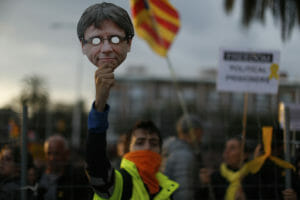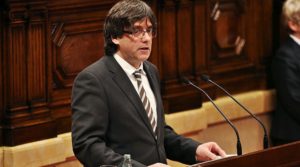Spain Is Trying to Prevent Catalans’ Independence Vote
The Catalan Parliament has called for a referendum Oct. 1 that would end Spanish control over Catalonia. A pro-independence rally at the Plaça de Catalunya in Barcelona, Spain, on Sept. 11. (Flickr / CC BY-NC 2.0)
A pro-independence rally at the Plaça de Catalunya in Barcelona, Spain, on Sept. 11. (Flickr / CC BY-NC 2.0)
Many Catalans plan to go to the polls Oct. 1 to vote on seceding from Spain. But in the meantime, the Spanish government is doing all it can to stop the vote from happening.
In June, the Catalan Parliament called for a referendum that, if passed and implemented, would end Spain’s legislative and administrative control over Catalonia, a northeastern region of Spain. Despite subsequent pressure from the Spanish government, Catalan President Carles Puigdemont intends to go ahead with the vote.
The Guardian reports:
If the Catalan government’s strategy has been to provoke a reaction from Madrid, it has succeeded. While refusing to discuss the issue, the Spanish government has lashed out with a series of threats, including taking control of Catalonia’s finances by 18 September and abolishing its regional autonomy. It has threatened to bar Catalan leaders from holding office and even warned them that they could face jail. The attorney general has also said that any mayor who allows local authority buildings to be used as polling stations could face prosecution. Meanwhile, mayors who say they will not facilitate the referendum are being picketed and sent hate mail by pro-secessionists.
Anyone printing or distributing ballot papers or supplying ballot boxes risks prosecution, and the government has even threatened to cut off the electricity to schools serving as polling stations. It has warned postal workers against handling electoral material. The Mossos d’Esquadra, the Catalan police force who became local heroes over their handling of the terrorist attacks last month, have been ordered to intervene to prevent voting taking place.
Last Wednesday, the Civil Guard shut the official referendum website, but within 24 hours Puigdemont had published a new link to the site on his Twitter account. WikiLeaks’ Julian Assange says he has been helping to defend the website.
Critics of the referendum, including Ada Colau, the mayor of Barcelona, say it lacks necessary guarantees and has set no minimum level of participation. However, she has reached an agreement with Puigdemont to facilitate the vote in the capital. Meanwhile the Catalan government has sent letters to 55,000 citizens calling on them to run the polling stations. Under the Catalan referendum law they are obliged to take part, but the law has been ruled illegal by Spain’s constitutional court.
In a last-ditch effort to break the deadlock, Colau and Puigdemont have sent a joint letter to the prime minister, Mariano Rajoy, and the king pleading for dialogue and a legally binding referendum. In the letter they appeal for an “open and unconditional dialogue”. Rajoy insists that he is open to dialogue on any topic – except a referendum on independence.
Last week, nearly a million Catalans gathered in Barcelona to call for independence. However, polls have shown Catalans are divided on whether to secede, with 49.4 percent against independence and 41.1 percent supporting the idea. In a similar referendum in November 2014, 80 percent voted yes, but the turnout rate was only 37 percent.
Your support matters…Independent journalism is under threat and overshadowed by heavily funded mainstream media.
You can help level the playing field. Become a member.
Your tax-deductible contribution keeps us digging beneath the headlines to give you thought-provoking, investigative reporting and analysis that unearths what's really happening- without compromise.
Give today to support our courageous, independent journalists.



You need to be a supporter to comment.
There are currently no responses to this article.
Be the first to respond.